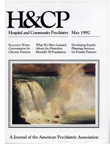High Needs and Low Priority of Mentally Ill Residents of Adult Homes
Abstract
Adult homes are a major residential resource for persons with serious mental illness. Although many adult homes provide substandard care and receive inadequate clinical support, little effective long-term action is taken to improve conditions. This paper describes factors that interact to create inertia in the adult home industry. They include a lack of effective regulatory agencies, unrealistic reimbursement policies, service delivery roles so broadly defined that they reduce the homes' power to compete for resources, clinicians' lack of identification with the industry, the scarcity of effective case management and service advocacy programs, and poor data bases. The interaction of these factors prevent owners of adult homes, other human service providers, and government agencies from establising self-sustaining corrective mechanisms.
Access content
To read the fulltext, please use one of the options below to sign in or purchase access.- Personal login
- Institutional Login
- Sign in via OpenAthens
- Register for access
-
Please login/register if you wish to pair your device and check access availability.
Not a subscriber?
PsychiatryOnline subscription options offer access to the DSM-5 library, books, journals, CME, and patient resources. This all-in-one virtual library provides psychiatrists and mental health professionals with key resources for diagnosis, treatment, research, and professional development.
Need more help? PsychiatryOnline Customer Service may be reached by emailing [email protected] or by calling 800-368-5777 (in the U.S.) or 703-907-7322 (outside the U.S.).



